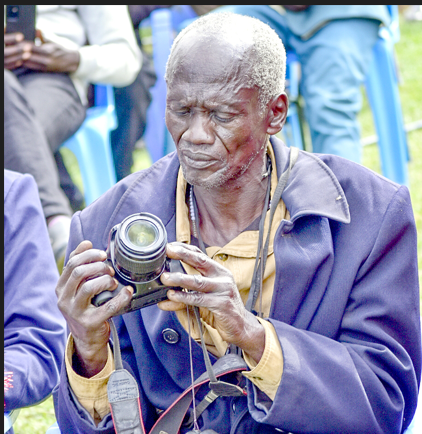Omoyo’s 50 years behind the lenses, yet still clicking away

In a world bombarded with visuals, there is an unsung hero who has spent five decades preserving life’s moments – Mzee Omoyo, a professional Kenyan photographer.
Omoyo’s lenses have chronicled everything from intimate family portraits to the grandour of the country’s momentous political events, leaving an indelible mark on the art of photography on the African continent.
His photography business, based in Elgeyo-Marakwet County, is still going strong decades after he founded it.
Omoyo is still bagging some returns in a sleepy town where professional cameras are still cherished over smartphones as he spends his weekends on events napping away pictures. He supplements the hobby with other engagements both as a cobbler and a farmer during the week.
Omoyo is so proud of his prime days while doing professional photography as the money he earned from it bought him land where he does farming.
As Omoyo narrates, his fascination with photography was ignited at the tender age of 16. In 1972, armed with a Canon’s manual camera that used film, he took his first steps into the world of photography.
His journey was anything but easy. Born at a time when conformity was the norm, his path was lined with hurdles that would test even the most determined.
Experience
Recollecting on the past, he says: “The community did not see photography as useful and certainly not a suitable career choice for a man. However, I would travel a lot around the Trans-Nzoia County and saw that those who pursued photography were doing well.”
As he did not get a chance to attend school, this showed him that photography could be a viable alternative. And being exposed to others in the field was just the encouragement he needed to leave any doubts behind.
Working as a professional, however, is not as simple as just deciding to do it. Skill comes with learning and experience, but this wasn’t something that was readily accessible to the young Omoyo.
Local photography courses didn’t exist, and online resources were over 30 years away.
“I had no option but to experiment, and this trial-and-error approach came with a price, especially as all cameras at that time relied on film. The challenges didn’t end with experimentation either. We also had the task of developing and printing photographs, often necessitating long journeys to the nearest town, only to find the services closed due to electricity outages,” he says.
With time, Omoyo’s talent improved, and his camera prowess became renowned. He ventured into unexpected realms, collaborating with community police in Eldoret Town. He remembers capturing crime scenes and taking pictures of suspects under arrest.
“The photographs served a purpose beyond mere images. They ensured that the police became acquainted with the faces of repeat offenders,” he recalls.
Additionally, his lens chronicled government events for over 16 years.
Beyond his professional pursuits, Omoyo embodies family devotion and community affinity. With a loving wife, two daughters, and three grandchildren, he channels his affection into heartwarming family portraits.
Today, even at the age of 70, he remains in demand, capturing the joy of weddings, engagement parties and precious family moments.
Mentoring
Armed with his faithful Canon EOS 600D camera, he is often invited to schools to take passport-style images of children. In the community, he is affectionately known as Mzee Wa Mapicha (the old man of pictures).
It marks the respect people have for him and honours his lengthy career as a photographer. His passion, however, extends beyond the camera lens.
He’s committed to empowering the youth. Drawing from personal experience, he champions photography and videography as viable career paths that can break the cycle of hardship.
“I already work with young people to reach this goal, such as Cosi, a young woman I both inspired and coached to become the professional photographer she is today. My vision entails creating a cycle of knowledge transfer, with budding photographers becoming future tutors and mentors themselves,’’ he says.
The term ‘journey’ outweighs ‘career’ in his lexicon, highlighting how being behind the camera is his way of life.
For Mzee, retirement isn’t a consideration: the camera is an extension of his soul, an instrument to learn, document and narrate stories that await capture.
“Photography is my way of preserving the essence of life, sharing its beauty, and leaving a legacy for generations to come,” he says.











